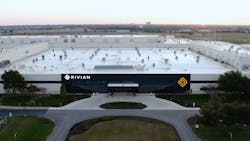Supply Chain Woes Lead Rivian to Slash Production Target
Continued supply chain snarls have led Rivian Inc. executives to cut in half their 2022 production target to 25,000.
Along with reporting Rivian’s fourth-quarter results, Founder, Chairman and CEO RJ Scaringe said the company’s Normal, Illinois, manufacturing plant is now producing vehicles at twice the rate of late 2021. But the factory is now outpacing Rivian’s supply chain, he added, although only a small number of products—mainly semiconductors, wire harnesses and some electronic parts made by contract manufacturers—account for a majority of the delays. With semiconductors, Scaringe said, Rivian is at a disadvantage because many suppliers are often basing their allocations to customers on 2021 production.
“It’s quite painful when we see our production plants really ramping and the lines running as we intend to [and] have to throttle production because of those shortages,” Scaringe said on a conference call with analysts and investors March 10. “This is something we’re laser-focused on. A morning doesn't go by where it's not a topic of conversation for us as a management team.”
Shares of Rivian (Ticker: RIVN) fell on word of the cut in output targets. In midday trading March 11, the stock was changing hands around $38, down more 7% on the day and less than half their levels of just two months ago. Rivian went public at $78 per share in November and soon after peaked near $180.
Rivian now has about 83,000 reservations for its R1 models, which is up from 71,000 in December. The company booked $54 million in revenues in the fourth quarter and posted net losses of $353 million. For 2022, the company’s leaders are forecasting an EBITDA loss of $4.75B, an increase from the $2.8 billion loss recorded last year. CFO Claire McDonough said capital expenditures are forecasted to grow to $2.6 billion from $1.8 billion in 2021 as Rivian ramps up R1 production capacity to 100,000 units annually and invests in battery, service network and technology projects, among other things.
On the conference call, McDonough said that while Rivian’s gross margins will be negative this year, the company’s long-term targets remain unchanged: Gross margins are forecast to rise to 25% over time while EBITDA and free cash flow margins are expected to grow to the high teens and about 10%, respectively.
Scaringe and Chief Growth Officer Jiten Behl on March 10 also addressed Rivian’s recent pricing faux pas, when the company raised prices on its vehicles by about 20%—including for buyers who had already placed orders, a move Scaringe had to reverse in short order. Behl said about half of the (unspecified number of) customers who canceled their orders soon after asked to have them reinstated and the pace of new orders in recent days “is very comparable” to that from before the news.
“It sort of validates the pricing model that we had shared with the world,” Behl said, referencing the rollout of a dual motor propulsion option to go with the higher pries. “We continue to be very confident at the competitiveness of our product and how it's going to result in the growth of our backlog and demand going forward.”
About the Author
Geert De Lombaerde
Senior Editor
A native of Belgium, Geert De Lombaerde has been in business journalism since the mid-1990s and writes about public companies, markets and economic trends for Endeavor Business Media publications, focusing on IndustryWeek, FleetOwner, Oil & Gas Journal, T&D World and Healthcare Innovation. He also curates the twice-monthly Market Moves Strategy newsletter that showcases Endeavor stories on strategy, leadership and investment and contributes to other Market Moves newsletters.
With a degree in journalism from the University of Missouri, he began his reporting career at the Business Courier in Cincinnati in 1997, initially covering retail and the courts before shifting to banking, insurance and investing. He later was managing editor and editor of the Nashville Business Journal before being named editor of the Nashville Post in early 2008. He led a team that helped grow the Post's online traffic more than fivefold before joining Endeavor in September 2021.
